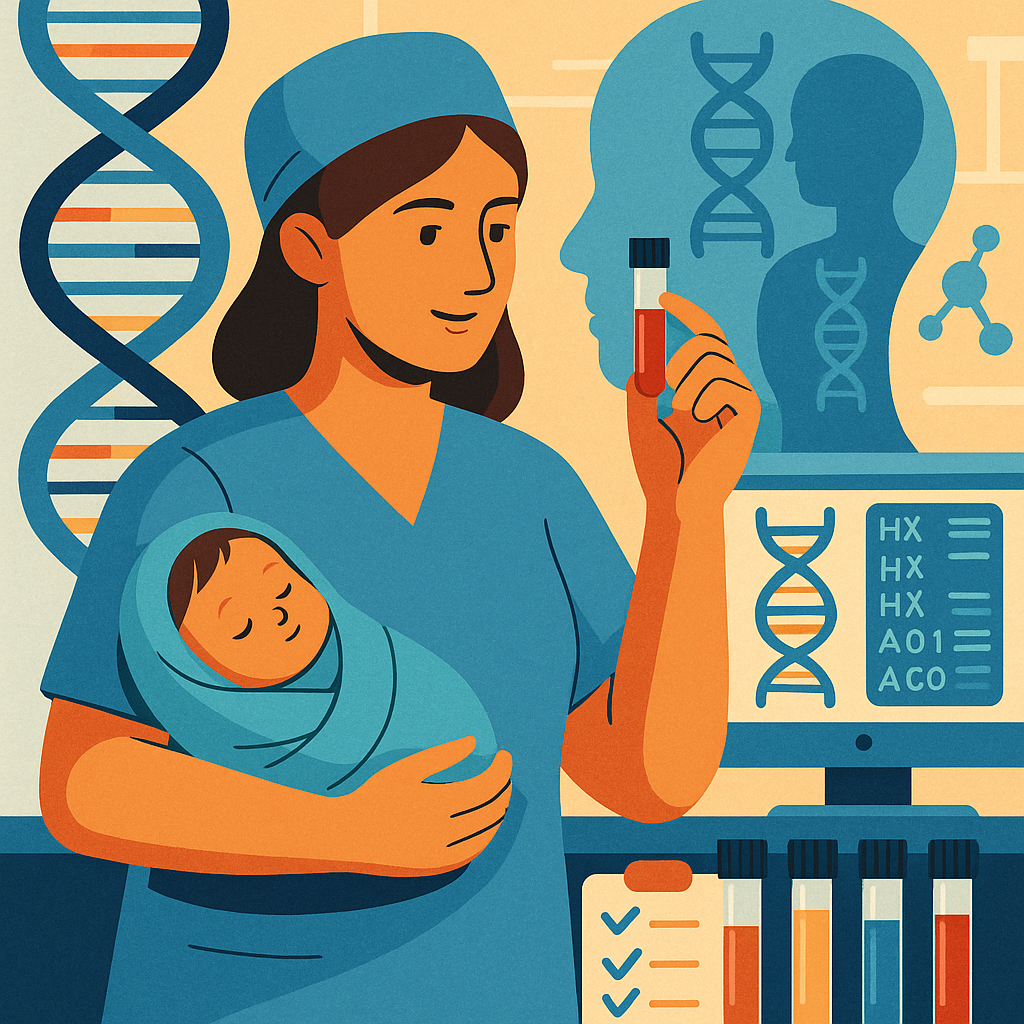A tiny drop of blood is rewriting the future of medicine. With rapid genetic testing now capable of diagnosing thousands of rare diseases in just three days, newborn care is entering an era of hyper-personalized treatment. This innovation not only promises to save countless lives but is also reshaping how early intervention in healthcare is approached—at a fraction of traditional costs and timelines.

Personalized Medicine: The New Standard in Healthcare
Personalized medicine uses genetic profiles to tailor healthcare to each individual, moving away from the one-size-fits-all approach. This model allows doctors to predict disease risks, choose effective treatments, and reduce adverse drug reactions. The approach has become a core strategy in oncology and pharmacology, and now, with genetic testing for newborns, it’s transforming pediatric care.
Revolutionary Blood Test for Newborns
Researchers from the University of Melbourne have developed a blood test that can detect more than 1,700 rare genetic conditions in infants using just 1 milliliter of blood. The process, which takes as little as three days, compares the baby’s proteins against healthy profiles to detect anomalies linked to genetic mutations. Traditional genetic testing methods can take weeks and often require invasive procedures like muscle biopsies. This new method not only shortens the timeline but also increases diagnostic accuracy dramatically—from 30-50% to an anticipated 50-70% of suspected cases (The Guardian 2025).
The speed and accuracy of this innovation are bolstered by trio analysis, which includes the DNA of both biological parents. This helps medical professionals narrow down the mutations responsible for the condition much more efficiently, often avoiding additional testing (New York Post 2025).
Pharmacogenomics: Personalized Prescriptions with DNA
One of the most promising applications of genetics in medicine lies in pharmacogenomics—the study of how genes affect a person’s response to drugs. In the Netherlands, thousands of individuals now carry a “DNA medication passport” that informs healthcare providers about how their body metabolizes certain drugs. This is especially crucial for medications like Metoprolol, where improper metabolism can lead to ineffectiveness or harmful side effects (Financial Times 2025).
These personalized prescriptions can eliminate the dangerous guesswork in medication dosing, helping reduce adverse drug reactions—a leading cause of hospitalization worldwide. Moreover, insurance coverage for such tests is already available in several countries, making pharmacogenomics a practical reality rather than a future concept.
Economic and Market Impact
The personalized medicine market is booming. It is projected to grow from $293.3 billion in 2023 to $658.4 billion by 2028, driven by advances in genetic testing, AI diagnostics, and biomarker-based therapies. Major healthcare players and biotech startups are investing heavily in technologies that decode individual genomes to offer hyper-specific treatments (Number Analytics 2025).
This trend is not just limited to rare diseases. Mainstream treatments for conditions like diabetes, cardiovascular disease, and cancer are increasingly incorporating genetic insights. As a result, the scope of personalized medicine is expanding well beyond its original niche.
Challenges in Accessibility and Ethics
While the benefits of personalized medicine are undeniable, there’s a growing concern about its equitable distribution. These advanced technologies, often available first in wealthier nations or among higher-income populations, risk widening the gap in healthcare access. A report from the AAMC warns that without systemic changes, personalized medicine might deepen health disparities rather than solve them (AAMC 2024).
There’s also the question of data privacy. With more genetic data being stored, concerns around data misuse, insurance discrimination, and consent are becoming increasingly prominent. Regulatory bodies are under pressure to implement frameworks that both support innovation and protect individuals’ rights.
A Future Where Treatment Begins Before Symptoms
One of the most exciting aspects of rapid newborn genetic testing is its potential to intervene before symptoms even arise. This is particularly relevant for conditions like spinal muscular atrophy or phenylketonuria, where early treatment can drastically improve outcomes. By identifying such diseases in their pre-symptomatic stages, doctors can start therapies that could otherwise be delayed for years.
Furthermore, as AI and machine learning evolve, the predictive power of genetic data will increase. Future iterations of genetic screening could not only detect diseases but also anticipate long-term health risks such as obesity, ADHD, or susceptibility to certain cancers. These insights will empower parents and healthcare providers with information that was once inconceivable.
The Role of AI in Personalized Medicine
Artificial Intelligence is playing a significant role in making personalized medicine viable on a larger scale. AI systems are now being trained to analyze genetic data and identify patterns that human experts might miss. These systems help predict which patients will respond to specific treatments, reducing the time and cost associated with trial-and-error medicine.
In combination with wearable tech and electronic health records, AI-driven platforms can provide continuous health monitoring, adjusting recommendations in real-time based on new genetic or health data. This synergy between genomics and AI is set to revolutionize not just diagnosis but also prevention.
Conclusion: Genetic Testing for Newborns is Just the Beginning
The integration of genetics into personalized medicine marks a new era in healthcare—one that emphasizes precision, prevention, and empowerment. The newborn blood test exemplifies how far science has come in making early, accurate, and affordable diagnosis a reality.
However, for this revolution to benefit everyone, it must be paired with thoughtful policies around access, education, and privacy. With continued investment and ethical foresight, personalized medicine can move from being a luxury to a universal standard.
References
- The Guardian. (2025, May 23). Blood test could speed diagnosis of rare diseases in babies. Available at: https://www.theguardian.com/science/2025/may/23/blood-test-could-speed-diagnosis-rare-diseases-babies (Accessed: 29 May 2025).
- New York Post. (2025, May 25). New test can rapidly detect thousands of rare genetic diseases: ‘Revolutionary to families’. Available at: https://nypost.com/2025/05/25/health/new-test-can-rapidly-detect-thousands-of-rare-genetic-diseases (Accessed: 29 May 2025).
- Financial Times. (2025, May 15). Personalised drug doses move a step closer with genetic testing. Available at: https://www.ft.com/content/87dce12d-9210-45fa-8ca0-995ee17f0aef (Accessed: 29 May 2025).
- Number Analytics. (2025, March). Next 5 Years: Personalized Medicine’s Rise in Pharma & Healthcare. Available at: https://www.numberanalytics.com/blog/next-5-years-personalized-medicine-rise-pharma-healthcare (Accessed: 29 May 2025).
- AAMC. (2024, March 7). Personalized medicine is coming, but who will have access to it?. Available at: https://www.aamc.org/news/personalized-medicine-coming-who-will-have-access-it (Accessed: 29 May 2025).






